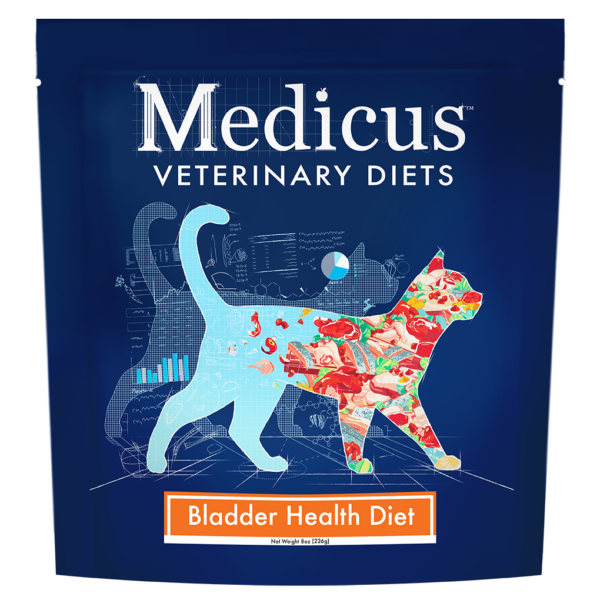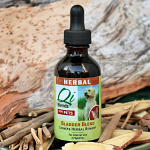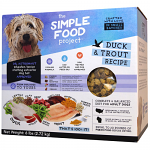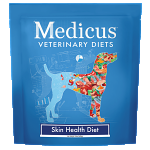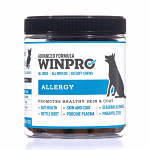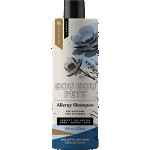Medicus Bladder Health Diets for cats are therapeutic meals designed to provide the unique nutritional framework needed for bladder health.
Diet Overview
Designed to protect the bladder and decrease the factors that contribute to struvite crystals. The Medicus Feline Bladder Health Diet is made with real, whole foods picked for their unique properties.
Highlights-
- High-quality digestible meat proteins
- Moderate carbohydrate
- Low calcium, phosphorus, and ash
- Moderate pH
- Healthy fats – Omega 6: Omega 3 Ratio 0.57:1
- Antioxidant
Who would benefit from this diet?-
- FLUTD
- Crystalluria
- Bladder Stone
How It Works
The Medicus Feline Bladder Health Diet is meticulously crafted to address these key nutritional needs:
Lowers the Components That Makeup Struvite Crystals-
- Reduced levels of calcium and phosphorus
- Moderated levels of magnesium
- Low ash content
Moderates pH to proper levels-
- Moderate pH with cranberry & apple cider vinegar
Protects the Bladder-
- Potassium Salt to increase urination
- Glucosamine coats the inner lining of the bladder to protect from irritation
Decreases Inflammation-
- Moderate carbohydrate
- Antioxidants from cranberry & blueberry
- Omega 3 fatty acids from ground krill
Chicken
A lean, warming protein rich in B6, iron, zinc, and selenium.
Egg
The egg itself is a complete protein, meaning it has all nine amino acids the body needs from food and is low in phosphorus.
Rice
Rich in fiber and antioxidants, but more importantly, the lowest phosphorus grain– a mineral that contributes to crystal formation.
Flaxseed
Full of polyphenols, an antioxidant that defends against oxidative stress to decrease inflammation.
Chicken Liver
The liver is also rich in CoQ10, which generates energy in cells but also serves as an antioxidant. Antioxidants help neutralize free radicals (reactive atoms produced by oxidative stress) in our bodies.
Chicken Gizzards
Rich in cartilage and glucosamine, plus a great source of protein, zinc, Vitamin B12, and iron.
Ground Krill
Brimming with nutrients including marine proteins, essential fatty acids, and a powerful antioxidant called astaxanthin, the combination is a powerful anti-inflammatory.
Cranberries
Cranberry acidifies urine to create an unfavorable environment for bacteria growth like E.coli, the most common culprits of UTIs. It also handcuffs itself to the bacteria preventing it from attaching to the bladder wall.
Blueberries
The highest amount of antioxidants among any fruit, blueberries help counteract oxidative stress to decrease inflammation.
Potassium Salt
Used as an electrolyte replenisher to ensure adequate potassium levels.
Sea Salt
Salt helps cells move nutrients and waste where it needs to go.
Ground Egg Shell
The shell is rich in calcium, and the membrane lining offers collagen, chondroitin, hyaluronic acid, and glucosamine.
Apple Cider Vinegar
Apple cider vinegar can help to neutralize the bacteria that have populated in the urinary tract. It also slightly acidifies the urine.
Glucosamine
Glucosamine coats the inner lining of the bladder to protect from irritation.
Mixed Tocopherols
Part of the vitamin E family (akin to vegetable oil) & often used as a natural preservative to maintain freshness.
Zinc Proteinate
A chelated mineral bound to an amino acid that protects against oxidative stress.
B Vitamins
Niacin, Riboflavin, Thiamine, Vitamin B12, Pyridoxine, and Folic Acid are incredibly fragile B vitamins. They help a variety of enzymes do their jobs, so food more easily turns into energy in the body.
Kelp
Naturally high in antioxidants with anti-inflammatory properties, and it’s a natural form of iodine.
Calorie Content
4247 kcal/Kg | 354 kcal/cup
Cups In A Bag
83.39 g/cup | 2 3/4 cups/8 oz
Complete & Balanced
The Medicus Feline Bladder Health Diet is formulated to meet the nutritional levels established by the AAFCO Cat Food Nutrient Profiles for adult maintenance.
Feeding Guide
Always consult your veterinarian before introducing this diet to your cat. Start with these daily feeding guidelines and follow your veterinarian’s suggestions about the number of meals per day and whether the daily recommendation is right for your cat.
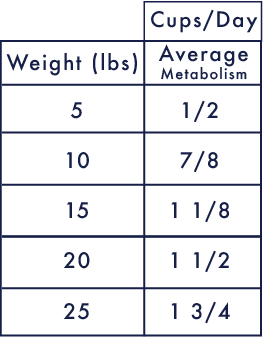
REHYDRATION RECOMMENDED
Water helps with digestion, circulation, and other bodily processes like perfusion (movement of fluids through the organ), which helps move the harmful byproducts through the filtration system and out of the body.
Palatibility Suggestions
Consult with your veterinarian before following these suggestions. Every cat and their condition is different, so it is best to learn whether the recommendations are right for your cat.
Chicken Bone Broth
Hydrate your cat’s food with chicken bone broth (no sodium) as a nutritious and enticing way to add moisture and flavor. It is low in calories and fat so the nutritional makeup of the Medicus Diet will not be altered.
Sardines
Place a sardine on top of your cat’s meal. They are rich in Omega 3 fatty acids, which have been shown to decrease inflammation that may be within the inner lining of the bladder
Kefir
Hydrate your cat’s food with kefir, which contains probiotics, beneficial enzymes, and vitamins B & K. It is also a great source of calcium.
Day 1-2
Feed 25% | 75%
Medicus | Current Food
Day 3-4
Feed 50% | 50%
Medicus | Current Food
Day 5-6
Feed 75% | 25%
Medicus | Current Food
Day 7
Feed 100%
Medicus
|
